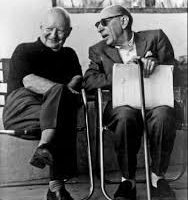I had a range of thoughts about Ellen Reid and Roxie Perkins's opera Prism, which won the Pulitzer prize. I loved Reid’s music, but thought the text by Perkins and also the staging (despite evocative design) were too elementary, somehow both too indirect and too obvious. And I longed for the days decades ago, when artistic music theater pieces had a much bigger audience. Prism showed us a metoo situation, painful and damaging, in which the hurting woman was held back by her mother from acknowledging the truth of what she’s been through. … [Read more...]
Me, John Kander, and the opera/music theater coup d’etat
Here's some history that might not be much remembered now. Involving a 1980s push to get new operas produced, and a funding coup pulled off by opera companies, theater companies, and Broadway producers. Which unexpectedly helped artists in what was then called the avant-garde, people like Meredith Monk and the late Robert Ashley. Back In the 80s, many of us were pushing to get more new operas produced. If we somehow could have known how much new work is on opera stages now, we'd have thought thst paradise was coming! That all our grants and … [Read more...]
My not so little son’s great taste
My son, Rafa, seven years old. And such taste in music. It might have been a year ago that he fell in love with the Hamilton cast album. Went to sleep to it every night. Had his favorite songs, and some he didn't like. And before that, Michael Jackson, especially "Thriller." But now he blows me away. A recent favorite was "Feel It Still," by Portugal. The Man (the group's name punctuated just that way, and with no period after Man). New to me, and I loved the song from the moment he started going to sleep to it, putting it on repeat … [Read more...]
More joy
I talked in my last post about Steven Isserlis making a concert joyful, because he felt joy himself. Two nights after I heard him, on March 8, went to the WoCo Fest, a festival of music by women, and was so radiated with joy that I cancelled plans I had for the next night, and went back again. What made WoCo Fest (presented by a new group, the Boulanger Initiative) so joyful? Well, we could start with the cause, music by women. Do something for a special reason, and maybe the event will be special. Or maybe not! I'm sure we've all been to … [Read more...]
Joyful music
I heard three joyful classical concerts a month ago, on three successive nights. Such happiness in a single week! I'll talk now about one of these evenings, Steven Isserlis playing music by men and women, with pianist Connie Shih, at the Kennedy Center on March 6, presented by Washington Performing Arts. So I don't make this post too long) I’ll momentarily hold two joyful evenings at the WoCo Launch Festival, an explosion of women’s music, presented in DC by a new group, the Boulanger Initiative. Which filled me with so much joy that I came … [Read more...]
Shaking my head
[Corrected version] Another day, more things in our classical music world that make me shake my head and smile. First a Boston Symphony press release, announcing what they’ll do next season. Bright, shiny language! They’ll offer “fresh, innovative projects alongside many of the most popular and impressive works ever composed for orchestra.” Which I guess sounds better than “fresh, innovative projects alongside the same stuff we always do.” Oddity alert: I’m quoting the press release I got by email. It’s … [Read more...]
Words from a student
Yesterday I had an enjoyable phone talk with a freshman at Stuyvesant High School in New York, which happens to be where I went, decades ago. He’s doing a project about why classical music isn’t popular today, and, as many people do, found me online and hoped I’d talk to him, which I was happy to do. I enjoyed every minute of our talk, and one part of it — how he came to classical music, and his reaction to his first orchestra concert — is worth reporting here. So how did he come to classical music? From hiphop. That would seem to be his … [Read more...]
Action on diversity, instead of talk
So refreshing! A major classical music institution taking strong action on diversity. This is the English National Opera, as reported in the Guardian in January. Their new CEO, Stuart Murphy, came to the ENO from a background in TV, and — maybe because on TV, even if things could go further, people do think about diversity, and take some degree of it for granted — he was shocked at what he saw at the ENO. To quote the Guardian: Opera is shockingly white, overly traditional and too slow to change, according to the leader of one of … [Read more...]
Could diversity get us more attention?
The answer to the question in the title — I think it’s yes. My thesis here: That classical music should be more diverse not just because of social justice. And not just because — in a 2019 world where, in the US, just about everyone in the public arena makes a point of being diverse — we look like backward fools because we’re so white. There’s also something else. If people of color played a larger part in what we do, we in turn might play a larger part in the world. Thus helping to close the gap between classical music and the rest of our … [Read more...]
Diversity story. Or non-diversity.
A story one of my students told me, a few years ago. I might not remember every detail. But as I recall, a family member was visiting this student. Someone who’d never been in New York. And fell in love with the variety of people on the street. As anyone might! The dynamic, varied, ever-changing life of a major US city is something to see. After a couple of days, my student took his relative to a classical concert at Lincoln Center. They walk into whichever hall it was, and the family member says, “Where is everyone?” Bewildered and … [Read more...]
Unacceptable
The Met Opera, presenting a nearly all-white profile in its streaming performance of La Traviata, faces (as far as I can see) no consequences for appearing nearly all white in 2019. They aren’t publicly shamed. They aren’t picketed or boycotted. They don’t (as far as I know) lose funding. Here I’m continuing my recent theme, by exploring yet another way in which our classical music community isn’t like the outside world. Diversity. I walk down the street, in Washington, DC where I live. Lots of people of color. I ride the busses there. … [Read more...]
Playing in the minor leagues
Saw some promotion from the Utah Symphony, with this about La mer: Allow yourself to answer the siren call of the sea with music that is so realistic you’ll want to ask for a life vest. Ooof! When I posted this on Facebook, people had fun thinking of things equally clunky. Because, obviously, La mer — evocative, sensual — doesn’t make you feel like you might drown! So this, from Susan Larson: "Tristan n Isolde, so sexy you’ll want to run out and commit adultery!” (And, by the way, there aren’t any sirens in La mer. They’re in the third … [Read more...]
We’re outliers
Yes, we in classical music have a focus, have concerns that the rest of the world might not share. And which might seem odd to people on the outside. It’s nothing new to say that our focus on the past is one of those odd-seeming things. Art of the past, in all genres? Of course! No problem, whether it’s a Shakespeare play, a Tolstoy novel, a Robert Frost poem, a Joan Crawford mov Many of us love those things. We just don’t focus on them. Theater companies do just as many new plays as old, serious readers read many new novels. And so on. … [Read more...]
They keep talking about pop music
So, yesterday’s post…about a delicious pop music reference in the Lifehacker blog, which — just so you know what a major production it is — according to Wikipedia has a staff of 18 people, is updated 18 times a day, and has editions in four countries outside the US)…my point was that references to pop music in our culture are ubiquitous, and we in classical music have to make them ourselves. If we want to live in the same world as the new audience we’d like to find. More evidence for that Yesterday I was watching Ari Melber’s show The … [Read more...]
Looking out from the bubble
Whoa…this is the 23d year I’ve taught my course on the future of classical music, at Juilliard. Which gives an idea of how long the classical music crisis has been going on. Way back in 1997 there was concern enough about our future to get me invited to teach. And here I still am. Here’s the course overview, and the week by week class schedule and assignments. I always start by asking the students to tell me about themselves, and about why the course interests them. In recent years I’ve been hearing a lot about the perceived isolation … [Read more...]















